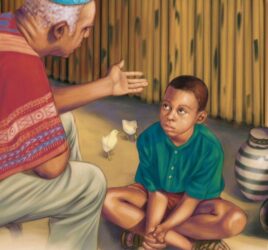
Open Your Eyes! There Is More To See Than You Realize, And It matters!
Open Your Eyes! There Is More To See Than You Realize, And It matters!
Profile for an Effective International Church Leader (Part 4)
Keep your eyes, your ears, and your mind open! Effective IC ministry has much to do with how the leaders understand the complex realities before them. A distorted understanding of the church and its people, and the context in which the church lives and serves God, and the result is distorted applications in every sermon and Bible study.
For example, what does it mean to be human both in terms of being made in the image of God, and in the collection of all realities that make us human today: we are social creatures, sinners, vulnerable, and affected by our physical, intellectual, emotional, and psychologically complicated. We all have histories, we all have secrets, we are all contradictory people. These all impact our relationship with God, our discipleship, and our involvements in churches. Leaders as much as anyone else.
Furthermore, an over-emphasis on individualism to the neglect of social dynamics will weaken the effectiveness of our preaching and leadership towards practicing the dynamics of the Body of Christ. How well do you understand social dynamics, and appreciate how these are working out well or badly in your IC?
The qualities of effective leaders and pastors developed in this part focus on four perspectives that are life-long challenges for all. Neglect any one of these and a distorted view of the realities you deal with is inevitable.
- Being Christ-centred is easier said than practiced. Far too readily we slip into focusing on secondary things, especially various assumptions as to how people should behave. Such assumptions usually grow out of inadequate understandings of the realities before us in people, society, and culture. A high and well-developed Christology is fundamental to being Christ-centred.
- Culture pervades everything all the time, the good, the neutral, and the bad. Discerning the cultural realities of oneself, the church and its people, and the context requires life-long intentional exploration. The multi-everything nature of an IC just multiplies the insights needed. Culture shapes how people think and process ideas, make decisions, engage in relationships (including a relationship with God), interpret Biblical values, understand leadership (authoritarian through to egalitarian styles), and think through the mix of individual and collective features of the body of Christ.
- Politics likewise pervades everything all the time. Culture and politics are inextricably integrated. Political perspectives and loyalties always influence our appreciation of Biblical ethics and morality, justice and injustice, and many social issues that require a mature Biblical theology. Just consider how Constantine’s endorsement of the Christian faith brought major changes to the functioning of the church. Or the differences in political perspectives between Anabaptists and other 16th Century Reformers, how Christians were on both sides of the abolitionist debates, and the ways Christians are on all sides in contemporary political rivalries. These rivalries clearly spill over into life with the church, how the church engages with the social, ethical and moral issues of the day, and consequently how those outside the church makes decisions about the faith.
- Life is spiritual – always – the principalities and powers seek to intrude into every church, every person, every issue, every political perspective. But there is also the powerful work of the Spirit in all aspects of Kingdom fulfilment in all creation. The human spirit is real and always a factor in every experience of faith, relationship with God, love of one another, and engagement with the world.
These four areas of perspective and understanding of the world around us are essential for effectiveness in international ministry.
- A centred-set thinker rather than a bounded-set thinker to ensure both focus and flexibility:
- Understands the difference and why it matters so much. See http://micn.org/tribalism-unity-2/
- Has a sufficiently strong and deep passion for Jesus and the Kingdom to drive from this centre.
- Holds secondary things loosely enough to be free to be appropriately flexible on boundaries and thereby free to keep the focus on the centre. While accepting that some boundaries may be helpful (non-negotiable essentials of Christian faith), the IC pastor ensures that a centred-set focus on Jesus and the Kingdom directs the life and mission of the IC. An over-emphasis on bounded-set thinking and practice inevitably favours the pastor’s culture, and denominational or national background, thereby weakening how much the IC really is international.
- Understands the difference between Theocentric/Christocentric and anthropocentric theology and practice (God centred or human centred) sufficient to ensure Jesus and His Kingdom shapes preaching and teaching, and the life and mission of the church. This is important as evangelicalism can tend towards being anthropocentric and it is very difficult to be centred in Jesus when most attention is given to other matters.
To what extent, and in what ways, do you think this is important in IC leadership?
In what ways does centred-set thinking facilitate an environment of grace?
In what areas of your leadership do you exercise bounded-set and centred-set thinking and action?
- At home with cross-cultural, and multi-cultural, thinking and practice; appreciates the depth, nuances and complexity of culture:
- Strong growing awareness and insight into the character, idiosyncrasies, strengths, limitations and failings of one’s own culture.
- Realization that cross-cultural studies in one’s home country are only a superficial introduction.
- Appreciation of the way culture shapes how humanity and faith are expressed by persons, how people process emotionally and intellectually, how people communicate, how people react, how we understand and value time, how people relate to others. Culture shapes – both in good and in unhelpful ways – all aspects of pastoral ministry and leadership, including pastoral care and counselling, leadership, church services, preaching, mission, finances, communication, motivation, etc.
- Not inclined to be ethno-centric, or nationalistic, or any other perspective that is dominated by one’s own background. An international and global perspective is needed on all issues.
- Strong appreciation of the spectrum of individual verses collective cultures, hierarchical verses flat cultures, diverse decision-making values and processes.
- Appreciation of the character and impact of such cultural foundations as shame/honour, guilt, nihilism, patron/client and power-based cultures, cyclical (resistant to change) rather than linear (progressive mind-set) assumptions about history, clean/unclean distinctions for lifestyle practices and social ordering, individualism/collectivism.
- Appreciation of how in most contexts political and socio-economic realities shape culture; and without serious critique shape faith as well.
- High level of ability to effectively relate, lead and engage cross-culturally in a multi-cultural context.
- Capacity and willingness to create culture; a church culture that reflects the movement of the Kingdom away from the fall. An alternative culture so that the people of the church have no need to import the culture of the world to fill the empty cultural space.
- Comprehends the shifting and evolving global mindsets of student and returnee populations of nationals.
- Understands the current global urbanizing of nations and the implication for ICs and for mission.
- Able to facilitate multi-cultural life in the IC. See # 12 below.
What cultural realities do you think IC pastors find most difficult to understand?
How do you learn what you do not yet know you need to learn?
- Understands the intrusion of politics into all of life and mission, and has a theology of politics (aka political theology) to facilitate non-partisan responses to the issues:
- Politics is an increasing issue for church life and mission in many countries. In nations all around the world, the increasing pressure from global issues, the increasing awareness of the impact of political issues into everyday life, the political issues of totalitarian societies, the shaping of societies by secularism, and the courting of churches by political parties for political loyalty, are just some of the growing intrusions of politics into Christian thinking and theology.
- Isolation in any form is no longer a realistic option for the church as political perspectives and agendas of various kinds intrude into the core values of Christian practice. Various governments across the world are increasingly making demands on churches in such areas as social justice advocacy, gender issues, employment policies, and in many cases a requirement that the church serve the interests of the power brokers in government.
- IC pastors and leaders need to appreciate the range of political perspectives across the evangelical community; and not presume that Christians will take up any particular stance on sensitive issues. Every IC has a mix of political preferences and the pastor may alienate some if his/her own political views are favoured above all others. Silence on matters political is, in itself, a political stance that risks disaffecting some in the church.
- In many countries, the failed marriage of the Christian right with conservative ideological politics, together with the failings of the “social gospel”, increasingly is requiring the development of a serious theology of politics. Recently, in many countries, this identification of evangelicalism with right-wing socio-political ideology has already caused many to leave the church and many to dismiss the faith.
- Appreciate the difference between the politics of Jesus and the Kingdom, and the political perspectives found within church and society from context to context.
- Aware of how political realities and political ideologies impact on how people engage in church life and mission activities. Political loyalties and ideologies are a serious threat to the unity of the body of Christ.
- Political theology is the exploration of the mind of God on the political and governmental life of societies. It addresses the nature of government, its priorities and constraints, its ethics and values, together with an emphasis on the model of Jesus’ rule as King of the Kingdom. It also explores the socio-economic impact of politics and government on persons and societies, both the good and the bad, and evaluates this in the light of such a theology.
What do you think are the most important political realities for IC pastors to understand?
How do you feel about increasing political influence in the church globally?
- Recognition of the spiritual realities underlying all of life, church and mission. Established reliance on the Holy Spirit in all facets of ministry:
- Able to appreciate that the sacred–secular divide in some Christian thinking does not reflect the comprehensive engagement of the Spirit of God is all of life and creation. With such a divide, understanding the context of the IC is considerably more difficult. Able to see the supernatural dimension in all of life and mission.
- A substantial understanding of the power of Word and Spirit as foundational in all God’s Kingdom work; and a strong appreciation of all human weakness. Likewise, a mature insight into the many ways Christian leaders can trust wrongly in their capacities, or their strategies and methods, or their church or denomination, or mission, or efforts, or politics, etc.
- A healthy and positive reliance on the Holy Spirit, walking in the Spirit in all aspects of life and ministry, while also maintaining a healthy self-suspicion as to how easily self-deception can enable leaders to falsely justify aspects of their ministry by claiming the Spirit’s work.
- A healthy understanding of the spiritual forces of darkness, without being obsessive about it, or consumed by it, together with a strong appreciation of the ways God would have us stand against these powers. Understand something of the principalities and powers as Paul describes their intrusion into every facet of life. This also is an important aspect of understanding the context of each IC. Able to discern the spiritual dimension of culture.
What is most essential for recognizing all the spiritual realities within the IC?
In the complexities of an IC, how does an IC pastor grow increasingly dependent on the Holy Spirit?
IN CONCLUSION:
Writing a profile for an effective missional IC Leader, including Pastor, is a bit like trying to describe a process to stack marbles. Maybe there is no complete way? Hopefully however, this Profile will be effective in the exciting task of finding and developing IC Pastors and other leaders for ICs around the globe. Whether you agree or not with some details, we hope that this stimulates your thinking, a lot! Probably, this Profile will need review quite often as our IC contexts keep on changing. If at any time you have further thoughts, please do not hesitate to send them to MICN.
Keep engaging; and check out the following questions.
FURTHER QUESTIONS:
- When you read this IC pastor Profile …
- What challenges you the most?
- What surprizes you most?
- What troubles you the most?
- What encourages you the most?
- In what ways does this Profile urge IC pastors to strive towards learning, expansion of vision, and theological depth?
- Has the Profile adequately stated the importance of IC pastors taking responsibility for their own maturation and growth?
- This Profile gives priority to theology and vision for leadership, rather than techniques and strategies, so what is at the heart of good IC leadership?
- What will you do, where will you go, who will you find to develop yourself further as an IC pastor?



